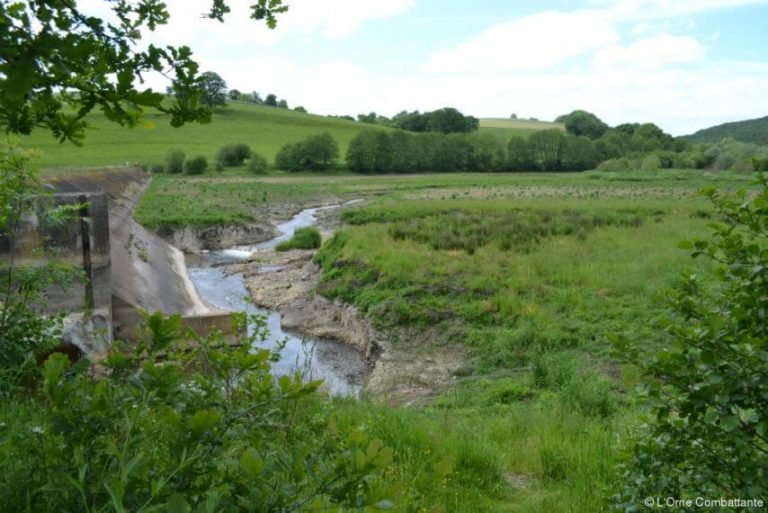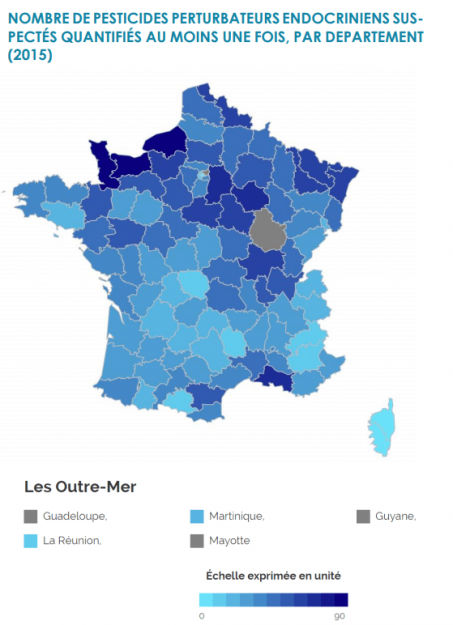Our Rivers are Overflowing with Pesticides, Suspected of Being Endocrine Disruptors

According to an unpublished study, published by Générations future Tuesday 16th April, 2019, pesticides suspected of being endocrine disruptors are present in waterways.
Tuesday, April 16, 2019, an unpublished study on the presence of pesticides , suspected of being endocrine disruptors , in French rivers, was published by the association Generations futures.
This new report complements previous environmental association studies of the presence of these chemicals in tap water, food and the body.
Three million results of analyses under the magnifying glass
The association first identified, from two databases (EU Pesticides database and TEDX that specifically focus on endocrine disruptors), potentially endocrine disrupting pesticides.
Future generations then verified which had been analyzed by the water agencies and listed, department by department, in the national database Naïades on the quality of surface water.
“We have to deplore the fact that the thresholds of quantification and detection do not seem to be the same for the different water agencies, underlines the association Generations futures. What’s more, some substances have not even been tested in some departments, but have been tested in others.”
Future generations therefore specify that in the absence of “a standardisation of methods and lists of substances sought, comparisons between different departments are therefore to be considered indicatively.”
Calvados, Manche and Seine-Maritime, worst affected

This ant work focused on the year 2015 and will be updated in June 2019, with the data of 2017. With 90 molecules quantified at least once on all of their rivers, the Normandy departments of Calvados, the Channel and Seine-Maritime are bad students.
With less than a dozen active substances detected, the rivers of Haute-Corse, Corse-du-Sud, Alpes-de-Haute-Provence, Hautes-Alpes, Ariège, Lozère and Creuse are the least exposed to endocrine disrupting pesticides.
At the level of the concentrations, some exceed the authorised limit (two micrograms per liter) for the production of drinking water. 35 exceedances are reported for glyphosate and 33 for metolachlor.
Glyphosate, atrazine, metolachlor …
In addition, according to the study, the three main substances found in French surface waters are glyphosate (in 37 departments), atrazine-desethyl (30 departments) and metolachlor (15 departments). the last two substances have been banned in the European Union (EU) for at least 10 years.
“For Generations Futures, these data showing the existence of significant suspected endocrine disrupting pesticide cocktails in the surface waters of many French departments are worrying,” says François Veillerette, director of Générations Futures.
As a reminder, in 2010, a study by an American scientist, Tyrone B. Hayes, demonstrated the effects, even at low doses, of the herbicide atrazine on the development of frogs: males become feminized or can become hermaphrodites.
Towards a ban on endocrine disruptors?
While it is the regions of large agricultural crops that are the most affected, François Veillerette ensures that it is “agricultural chemistry that threatens aquatic biodiversity”:
“These results are also to be interpreted as the indicator of a significant contamination of the environment in which humans live. “
For all these reasons, Generations is asking the “leaders” to “urgently implement a national strategy on endocrine disruptors that really aims at their total ban”.
What is an endocrine disruptor?
Endocrine disruptors are chemical substances of natural or artificial origin foreign to the body. They can interfere with the functioning of the endocrine system and induce adverse effects on the body of an individual or on his descendants. (World Health Organization, 2002)
Helping farmers to change their practices
Faced with these findings, Stéphane Donckele, Secretary General of the National Federation of Farmers’ Unions (FNSEA) of Seine-Maritime, reacts. He recalls that the two substances most present in rivers are now prohibited: “Atrazine, for example, was used extensively in the 1970s, for lack of knowledge. But today, we do not use it anymore. ”
It ensures that today, the use of the products used is highly regulated. “And the use of chemistry is not systematic. Depending on the weather, rain, crops etc., we use phytosanitary products or not. ”
Aware of the concern that this study may cause, Stéphane Donckele is not opposed to changing his practices. “But we have to be given something instead that allows us to be economically viable. Because if we forbid everything in France, it is the death of French farmers. For the moment, we criticize without proposing anything else. ”
Fed up with “agribashing”
Stéphane Donckele recalls that in 2018, the use of phytosanitary products by farmers decreased by 3%. He also cites the sustainability index of agricultural and food models around the world, published by the British magazine The Economist . “For the third consecutive year, France is first on the charts. We are going in the right direction. ”
Finally, the general secretary of the FNSEA Seine-Maritime is fed up with “agribashing” and points to the ammonium present in the watercourse: “This comes from sewage treatment and purification stations. And that, we never talk about it. ”
Decrease pesticides while maintaining a yield
For his part, Jean-Bernard Lozier, a farmer from the south of Eure, a member of the Confederation Paysanne, ensures that we can reduce the use of phytosanitary products while remaining economically viable.
Since the Grenelle of the environment, this Normand is part of a test: Dephy farms , whose goal is to reduce the use of pesticides at least 50%, while trying to keep an interesting yield.
“Since 2009, I participate in this challenge and the results are really positive. If we have a little less efficiency, we have less expenditure in plant protection products, so we get the same economic results.”
With Dephy farms, Jean-Bernard wants to show that there are alternatives to conventional farming. “On a nine-year cycle, I alternate crops of rapeseed, wheat, barley, flax, corn, peas, beans … I cover the soil, I choose the plants that go with the ones I grow, I use weeding mechanical. ”
“A return to our real job”
For him, it’s a return to agronomy, “to our real job, it’s no longer chemistry that does everything”. “In fact, I do almost like organic farmers but if there is a problem, I put a few phytosanitary products. For me, it’s a smooth transition that all farmers can do, it’s less radical than going organic. ”
Because Jean-Bernard Lozier is not fooled:
“If we get to 20% organic farmers but let others continue to pollute the soil, it is useless. We really have to get everyone involved. And it is possible. “
Enjoyed this? Get the week’s top France stories
One email every Sunday. Unsubscribe anytime.


